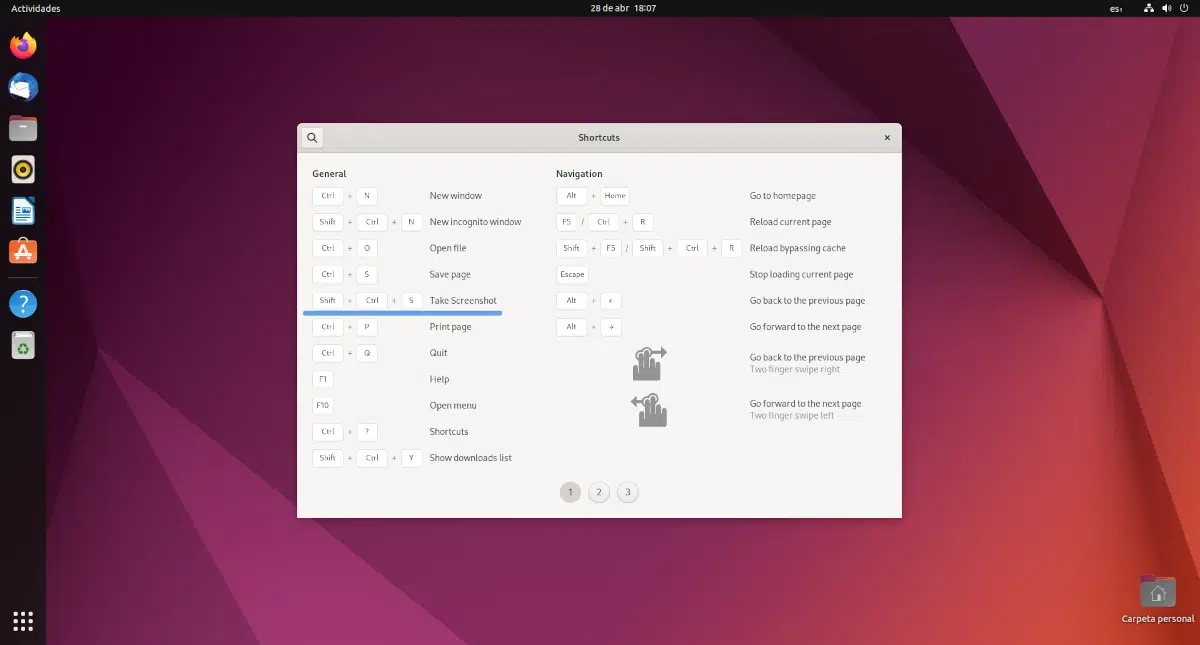
In early July, when we publish In that week's GNOME news note, we teased that GNOME Web, also known as Epiphany, would support extensions. It is a very important step forward, but the project does not seem to want to stand there. GNOME is preparing more improvements for your browser, such as the fact that it will soon be more friendly to take screenshots: we will be able to capture what we see from the contextual menu (right click) or by pressing Shift + Ctrl + S, from «screenshot».
Moreover, the desktop will continue to improve its fluidity. It is one of the points that seems to be attracting the most attention from the GNOME team, since something similar is mentioned with each new release of the desktop, especially in major updates. Below you have all the news that they have advanced this week in GNOME.
This week in GNOME
- The performance of the GNOME Shell layout has been optimized. This code moves each frame during the animation display, so it is important that it is fast.
- Photos now uses the wallpaper portal to set an image as your wallpaper or lock screen wallpaper.
- Solanum now has the ability to complete reset sessions without restarting the app.
- NewsFlash has recently gained support for Nextcloud News. It only supports API v1.3 which will be available in its next version 18.1.1. The login and reset pages have received a libadwaita makeover and are now more mobile friendly. And of course there is the new libadwaita “about” dialog to mention.
- Amberol 0.9.0 is out, now with fuzzy matching when searching within the playlist, a bunch of bug fixes in code, styling, and dependencies dealing with metadata loading, and translation updates. The new version is available on Flathub, and also in most software centers that are available in Linux, that is, in official repositories.
- Loupe now has the ability to display file properties. NOTE: These are based on the basic file information and not current exif data. Properties based on exif data will come later.
- Release of Lobjur, a GTK4 client for lobster.rs. It has:
- Possibility to browse the most popular and recent stories.
- Comments view of each story.
- Possibility of browsing by labels, domain or user.
- View of some information about the user who has commented under the story.
- Link to Flatub.
- The first version (and the first minor patch) of Ear Tag is now available. Ear Tag is a small and simple music tag editor intended to be used for editing individual files, rather than entire collections of music like many other tagging programs. It's available on FlatHub, and the code can be found on the launch page.
- One of the GSoC students made great strides in developing support for the Chromecast protocol (Cast v2) in GNOME's network screens.
- Two new tutorials are now available on the GNOME Developer Documentation website: How to Implement Drag and Drop with GTK and How and When to Use Composite Widget Templates. The full project code for the getting started tutorial is now available on GitLab.
- ReadingStrip is an extension for Gnome-Shell. It works as a reading guide for the computer and this is really helpful for people affected by dyslexia. It works great to help kids focus on reading as it marks the sentence they are reading and hides the one before and the one after. It is already used in educational projects in schools, it puts the attention on the screen but it is also very useful for programmers and graphic designers who want to review their work.
- GNOME Nightly now has the necessary infrastructure to build and deploy your nightly applications targeting aarch64.
And that's been it for this week at GNOME.